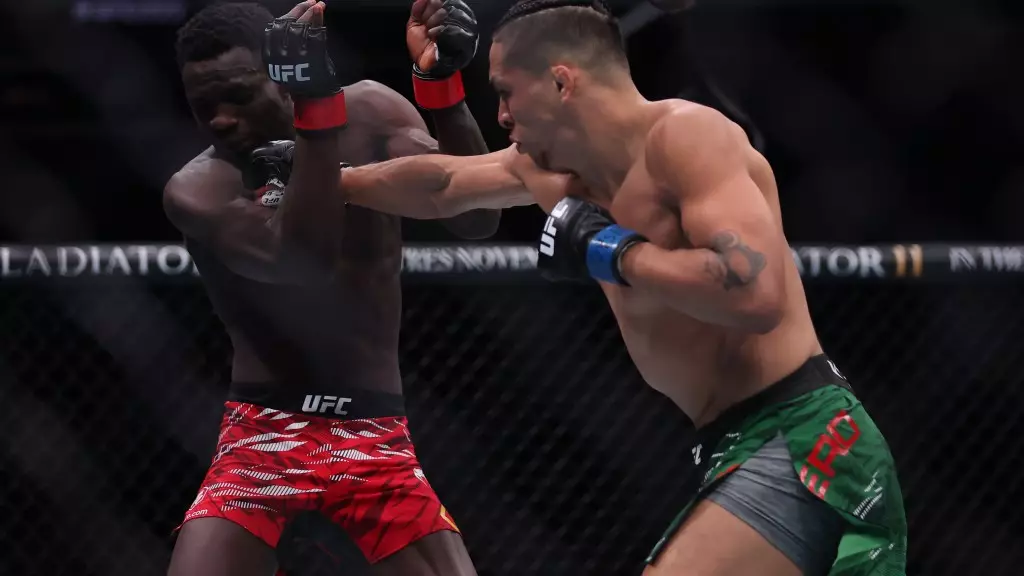In the world of mixed martial arts, few scenarios are more daunting than stepping into the octagon on short notice. Roberto Romero found himself in precisely that position at UFC 309, held at the iconic Madison Square Garden. His bout against seasoned fighter David Onama came just days after he accepted the fight, stepping in for Lucas Almeida. Against a backdrop of overwhelming odds, with Onama being a hefty -1000 favorite, Romero donned the role of the underdog, a narrative often explored in sports but perhaps never more poignant than in combat sports where physical and mental fortitude are tested to their limits.
Romero’s decision to step into the octagon without a full training camp reflects not only his bravery but also his commitment to the sport. While many would advise caution, Romero saw this opportunity as a gateway to showcase his skills. His professional record of 8-4-1 could have instilled self-doubt; however, it instead fueled a resolve to prove himself against a formidable opponent.
The first round of the fight was a revelation. Romero came out explosively, showcasing his striking capabilities and nearly finishing Onama. As he struck with intensity, fans and commentators alike began to sense an upset in the making. However, rather than securing a quick finish, Romero opted for a tactical approach that would ultimately be the focus of his post-fight reflections.
In an interview after the bout, Romero expressed his conflicting emotions. He looked back on the pivotal moment in that first round with a sense of regret, pondering whether his choice to take Onama’s back rather than continue the onslaught might have altered the outcome of the match. “The ‘what if’ doesn’t exist,” he stated, encapsulating the harsh reality athletes often face when hindsight taints their decisions.
This moment of introspection is what distinguishes elite athletes from others. The ability to analyze one’s performance critically is crucial for growth. Nonetheless, overcoming the emotional aftermath of defeat is no straightforward task. Romeo revealed that it took him a full day to process the adrenaline and mixed feelings that flooded his mind following the fight. This honesty invites empathy from fans and serves as a reminder that behind the muscular frames and fierce competition lies a human experience marked by vulnerability.
Despite the disappointment that came with not achieving victory, Romero emerged with a sense of pride. He articulated his mental and emotional journey after the fight—navigating through the sorrow of defeat to rediscover gratitude for the experience itself. “I did go in there to win,” he emphasized. It was not a lack of ambition or effort that led to his loss but rather the nature of competition where multiple factors—skill, experience, and sometimes sheer luck—converge.
The support that Romero received from fans, coaches, and family post-fight underscored the importance of community in sports. They were a source of uplifting encouragement, reminding him that every setback provides fertile ground for growth. This solidarity is a foundation in combat sports culture, which often emphasizes respect and camaraderie among competitors.
What does the future hold for Roberto Romero? While he may have faced a setback in UFC 309, his indomitable spirit illustrates a fighter who has not bowed down to defeat. The learning experience he gained from this fight provides an invaluable asset for future bouts. If anything, this match has set the stage for Romero to build resilience and adaptability—two qualities that will serve him well in his career ahead.
Romero’s fight at UFC 309 was more than just a loss on paper; it became a crucial chapter in his evolving narrative as a mixed martial artist. It highlights the emotional rollercoaster athletes endure, not merely the physical one. As he continues to learn and grow from this experience, the fighting community and fans alike can look forward to seeing how Romero channels this setback into future success in the octagon. His journey serves as an inspiring reminder that in defeat, one can uncover the strength to rise yet again.

